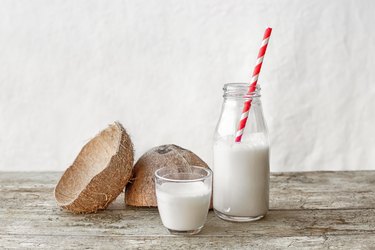
A flavorful addition to creamy curries and a delicious alternative to cow's milk for your morning cereal, coconut milk is perfect for plant-based beverages and cooking. While there are many coconut milk benefits, there are some drawbacks too.
Tip
Coconut milk may offer a few benefits for bowel health, but it has several drawbacks as well. It should only be consumed in moderation.
Video of the Day
Coconut Milk Benefits and Drawbacks
When people talk about coconut milk, they may be discussing two different products. One is the beverage, which is considered a plant-based milk alternative. It comes in cartons and is often found in the same area of the grocery store as milk.
Video of the Day
The other is canned coconut milk, a fattier, creamier version that is a staple in Asian cooking, such as when making Indian curries and Thai soups. It can also stand in for cream in many other recipes and is usually found in the Asian foods section.
Coconut milk as a beverage has a lot going for it. It's much easier for many people to digest than milk because it doesn't contain the milk sugar lactose. And, like any fluid, it's hydrating. Staying hydrated is crucial for keeping your stool soft and moving everything along in the right direction.
But for both types of coconut milk, there may be other drawbacks for bowel health. The first problem is the fat in culinary coconut milk. One cup of canned coconut milk contains 48 grams of fat per cup, per USDA FoodData Central data. Coconut milk as a beverage has only 5 grams per cup. Coconut milk calories log in at 445 calories per cup, which is high compared to that of regular milk at 161 calories per cup.
According to analysis published in Advanced Biomedical Research in April 2016, studies show that fatty meals result in symptoms of indigestion, including fullness, bloating and nausea. The authors concluded that fatty foods may exacerbate indigestion in people prone to it.
The International Foundation for Gastrointestinal Disorders says that foods high in fat may cause abdominal cramps and diarrhea. This could account for any coconut milk laxative properties that some people may experience.
Other Ingredients in Coconut Milk
Most coconut milk beverages and many canned coconut milks contain other ingredients besides coconut milk. These include preservatives, added sugars, and substances used as stabilizers, thickeners and emulsifiers such as guar gum, locust bean gum and gellan gum. Some people may have no problem digesting these ingredients, while others experience gas, bloating, cramps and other undesirable effects after drinking beverages containing them.
Carrageenan, a gum made from red seaweed, is a widely used additive that has garnered attention recently for its potential negative health effects. Early research shows it may contribute to gastrointestinal distress, according to a report published in Clinical Medical Reviews and Case Reports in 2015.
Added sugar is another problem that affects digestive health. Coconut milk beverages labeled as original and plain often contain added sugars. The original version of one popular brand of coconut milk lists cane sugar as the second ingredient, with 5 grams of added sugar per serving.
According to a review published in Advances in Nutrition in November 2019, added sugars disrupt the gut microbiome, the population of healthy bacteria in the gut. In addition to supporting overall health, the microbiome plays a major role in digestive health and is associated with an array of digestive diseases, including inflammatory bowel disease and irritable bowel syndrome, explains a review article published in the World Journal of Gastroenterology in August 2015.
Protect Your Bowel Health
It's clear that coconut milk and many dairy substitutes can have some negative effects on your digestive health if you don't choose wisely. But it doesn't mean you have to give up coconut milk if you like it.
For cooking, you can lower the fat content by using light coconut milk, which has more of the coconut water than the full fat version. One cup of light coconut milk contains only 16 grams of fat per cup, according to the USDA FoodCentral Data. This is not only beneficial if the fat upsets your stomach, but it can also help you control your calorie and saturated fat intake, which is good for your weight and heart health.
Be sure to check the label and choose coconut milk beverages without any added sugar. These will usually say 'unsweetened' on the label. If you have reactions to other additives, make sure you read the labels first and avoid those products as well.
- USDA FoodData Central: "Nuts, Coconut Milk, Canned (Liquid Expressed From Grated Meat and Water)"
- USDA FoodData Central: "Coconut Milk"
- Advanced Biomedical Research: "Dietary Fat Intake and Functional Dyspepsia"
- International Foundation for Gastrointestinal Disorders: "Diet and IBS"
- Clinical Medical Reviews and Case Reports: ""Dairy-Free" Dietary Substitute, Abdominal Pain, and Weight Loss"
- Silk: "Original Coconutmilk"
- Advances in Nutrition: "Adaptation of the Gut Microbiota to Modern Dietary Sugars and Sweeteners"
- World Journal of Gastroenterology: "Role of the Normal Gut Microbiota"
- USDA FoodData Central: "Light Coconut Milk"
- USDA Food Data Central: "Milk"